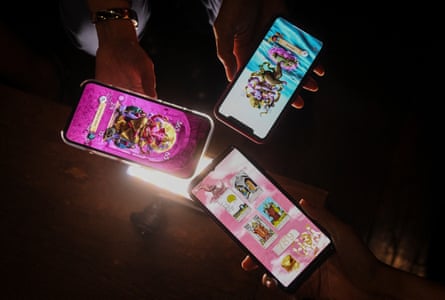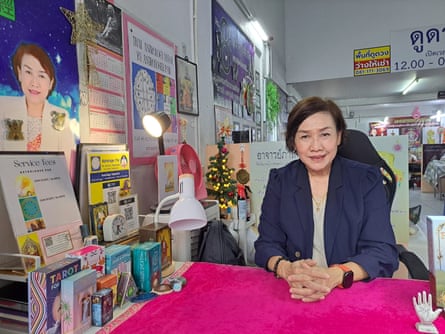When Whan consulted her new fortune teller about the future of her relationship with her boyfriend, she was told that one half of the couple tended to be sulky, while the other would over-analyse things. The fortune teller recommended that they try to be more open with each other.
But the advice on the future of the relationship didn’t come from a human – it came from ChatGPT.
In Thailand, a country with a rich tradition of fortune telling, Whan, 28, is among a growing number of young people turning to ChatGPT for answers about their future. On social media, users share advice on how to upload pictures of their palms for palm readings, and of their birth charts, which show the positions of the planets at the time of their birth.
Usually, if Whan wants to see her fortune teller, she needs to book an appointment months in advance - and pay 599 baht [£13.55] for a one hour session. So, when she saw comments on social media praising the accuracy of ChatGPT’s readings, she decided to give it a try. She typed into the chat box: “I saw many people have asked you about their fortune based on a birth chart. Can you do it for me?”
It replied: “My pleasure”, before asking the time, date and location of her birth.
Satisfied with her first reading, Whan, who asked to use only her nickname, later uploaded a picture of her face for a face reading, and asked ChatGPT to analyse her compatibility with her boyfriend.

The importance of fortune tellers - called “Mor Doo,” meaning “doctors who see” - dates back centuries in Thailand, a majority Buddhist country, where culture is shaped by astrology and other forms of divination.
Fortune tellers are consulted by anyone from politicians or wealthy business people weighing up investment decisions, to students nervous about their exam results or curious about their love life.
Estimates of the size of the market for spiritual goods and services vary, though last year the University of the Thai Chamber of Commerce suggested it was worth between $304 and $456m.
Research produced in January by Krungsri Bank found that younger people were most likely of all generations to buy such products online, and that of the growing range of spiritual services offered through digital technologies, fortune telling applications drew the most interest from all ages.
Jirapat Wangcharoen, 27, a content creator focused on astrology and spirituality, has benefited from the rising trend. On his TikTok account Nesh the Wizard, he has shared advice using ChatGPT, with one video last October liked by tens of thousands of users.
Jirapat researched the use of AI as a personal navigation tool while studying his Master’s degree in Australia. “My key takeaway was people just want to take their anxieties away as soon as possible,” he said. “If they have a question at night, at 1am, they don’t want to linger on that… They go to ChatGPT or TikTok live to ask the question.”
“It’s easier for them [young people] to talk to robots rather than humans,” he added.
While fortune tellers can easily be found on social media, or sitting at tables outside temples, people often prefer to use someone they trust and have consulted previously, or who has been recommended. This can mean they need to wait for an appointment.
Ruchi Agarwal, assistant professor of anthropology at Mahidol University, said curiosity about the future peaks in times of instability. “If you look at the past trends, whenever there was economic crisis or political crisis, then there was always a search for either spirit mediums or fortune tellers – just as a psychological remedy, or for finding some solution to the uncertainty they face,” she said.
This is also the case for younger people today, who have lived through political instability and the pandemic, and who are also, she said, “more in their silos, and more attached to social media”.
Ajarn Par, or Master Par, an astrologist based in Huai Khwang, an area of Bangkok known for its popular Ganesha Shrine and fortune tellers, agreed that younger people are searching for meaning. “It’s [a way of building] emotional resilience in an uncertain world,” she said. “Young people have a feeling of [a lack] of control.”
Some have raised concerns about the risk of giving AI tools with personal information such as photos or birth details. And, opinions are divided over whether ChatGPT or other AI tools will have long-lasting appeal among those interested in astrology.

Ajarn Par believes ChatGPT may be capable of relaying data about astrological principles, but she questions its benefits.
“To give proper guidance, you need to have lived experience… [human fortune tellers] have the feeling of human intuition,” she said.
She likens fortune tellers’ role to that of a therapist, someone people can consult in their most difficult moments. None of this can be replicated by a computer, she said. “A robot cannot touch your feelings.”
For Whan, there are positives to consulting both humans and ChatGPT. With a human teller, she said, you can see their face and reactions.
But with AI: “you can just use it right away - and you can keep asking them.”

 3 months ago
121
3 months ago
121

















































